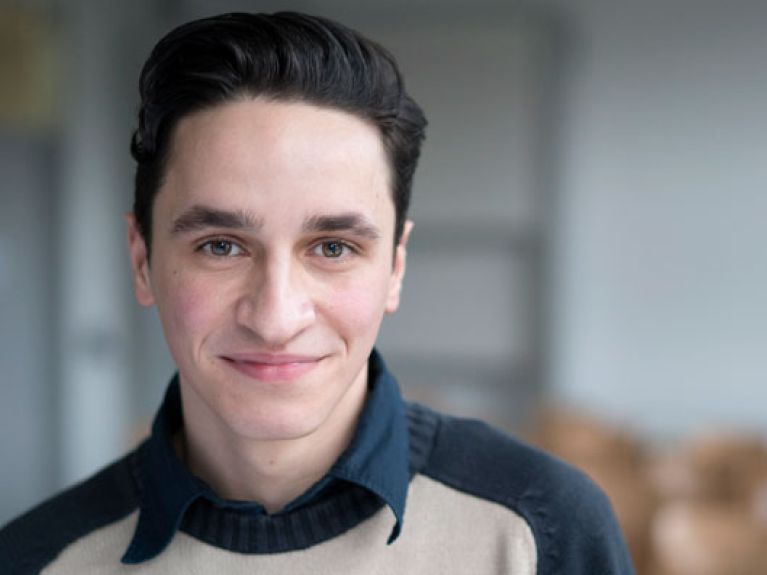A maths problem was the breakthrough
Just a year after fleeing from Syria, Wael Amayri already speaks German and is at university. In our interview he explains how he achieved this.

Until two years ago, Wael Amayri, a young Palestinian who grew up in Syria, was studying information technology in Damascus. He decided to leave Syria in October 2015 because he was unable to obtain a visa. He joined the family of a friend, and a few weeks later the small group arrived in Germany. This stateless young man with Syrian travel documents is now living in Berlin. The 22-year-old uses WhatsApp to keep in touch with his family, who have moved in with friends in Damascus because their own home was destroyed.
Mr Amayri, after just 16 months in Germany you speak German as if you had been here for years. What is your secret?
While I was still in Damascus I found myself a language tandem partner so as to be able to practise a bit via the Internet. That’s how I had previously learnt English. Nonetheless, I couldn’t speak much German when I arrived in Germany, but I started learning immediately. And I had a very good teacher.
Where?
As part of the Welcome@FUBerlin programme at Freie Universität Berlin, which is where my tandem partner was studying. While I was still en route to Germany, somewhere in Serbia, I received a WhatsApp message from her: there are courses for refugees in Berlin! I hadn’t even arrived when the course began, but I came a few days later and was lucky enough still to be able to join.
Where were you living at that time?
I spent a few days in a sports hall, in an initial reception facility. It was very loud because lots of families live there, with children running around and screaming. It was impossible to study, and I was also lonely. The friend I had travelled to Germany with had been transferred to a different city. There was no washing machine and the showers were not clean. I then posted on Facebook that I would like to wash my stuff and take a shower.
What was the result of your Facebook post?
I kept being offered rooms. At first I lived with a German-British couple. I still keep in touch with them to this day, and they even invited me to spend Christmas with their family. Later I moved in with an engineer who really helped me a lot to learn German. I now share a flat with two others in the south of Berlin. I like the fact that it is so green around there. There is a river where I often go for a walk, and a lake nearby. In Damascus I had always wanted to live in nature.
You managed to enrol on a university degree course in less than a year. Are you the only one?
No. One of my fellow students from the language course is studying IT with me, while another is doing ethics and English literature. There are not many, however – and I must admit that the official language test for German universities (DSH) is very difficult. Because I did not reach the necessary level at my first attempt, I was only admitted on a temporary basis, but now I have passed.
And how do you get on in the seminars? Surely most students there are native German speakers.
Yes, that is true, and at first I hardly dared say anything. But then we were set a really difficult maths problem. It took me nearly an hour to work out the answer, but then I had it. So I plucked up my courage and went up to the board – and everyone thought it was really great. Ever since, I have always wanted to show the others how to work out the answer. This also ties in with my desire to become a university lecturer. I now hope to reach my goal as quickly as possible: if I attend some extra courses in the summer, I may even get my bachelor’s degree in less than three years.
Are you not homesick?
Hardly ever. Of course I miss my family a lot. But I do not miss the sense of uncertainty, the power and Internet outages, or the lack of heating in the winter. And now I have found a home here in Germany. I have got to know friends who see me as part of their family. I am not lonely or sad. Now I just hope that I will be allowed to stay. Currently I have subsidiary protection status for one year. I am very happy that I am entitled to a Bafög student loan nonetheless. So far, so many people have helped me that I feel optimistic. It is very different to the way I felt in Syria – I certainly did not consider myself so fortunate there.
Interview:_Jeannette Goddar
© www.deutschland.de

